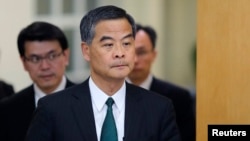Hong Kong’s government could vote as early as next month on a controversial electoral reform plan that was the subject of mass demonstrations late last year.
Hong Kong's Chief Executive Leung Chun-ying this week urged pro-democratic politicians, who have vowed to block the package, to give up their fight for universal suffrage if the government election reform plan is not passed. He said Hong Kong cannot continue to debate its political reforms and instead must place a renewed focus on developing the economy.
The Beijing-backed reforms would allow voters in the autonomous Chinese territory to choose a chief executive for the first time in 2017, but only from a limited pool of candidates chosen by a 1,200-member committee.
Regina Ip, a legislator and member of the Executive Council, said she expects further political gridlock if Hong Kong’s electoral reform proposal is not passed.
“If the motion is not passed, there may not be commotion outside of the legislative council, but I think political non-cooperation on the part of the [pan-democrats] would worsen in the remaining two years of Mr. Leung’s term, making it hard for the government to make progress on all of the structural issues," Ip said.
Demonstrations last year
Leung’s comments come after tens of thousands of protesters filled Hong Kong’s streets last October demanding direct elections of the city’s chief executive.
If the reform plan fails to pass the legislature in a vote this summer, the chief executive would be chosen directly by an election committee made of up local business leaders and lawmakers, as it has been since Britain handed over control of the city to China in 1997.
Pro-democratic lawmakers such as Emily Lau, head of Hong Kong’s Democratic Party, said they are continuing their efforts to educate the public about the universal suffrage and the current proposal for electoral reform.
“We have been taking to the streets and handing out pamphlets to explain to the people about why we cannot support the government package, and I think that many people are quite aware about what is going on, but the community is very, very split," Lau said.
According to a survey conducted by the University of Hong Kong, the Chinese University of Hong Kong and the Hong Kong Polytechnic University, 44 percent of respondents in the city supported the government’s election proposal and 37.1 percent opposed it.
This weekend, Hong Kong's legislators will meet with representatives of China’s central government in Shenzhen. Pan-democratic lawmakers will have the opportunity to exchange views and ask questions of central government officials during the last two hours of the meeting, scheduled for Sunday.
For university students like Nora Lam at the University of Hong Kong concerns persist over the influence of mainland China on Hong Kong’s system of governance and culture.
“We fear that under the influence of China that the culture, the unique social situation in Hong Kong is going away. For example, the culture and the language is being diluted by mainland China," Lam said.




